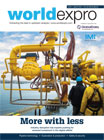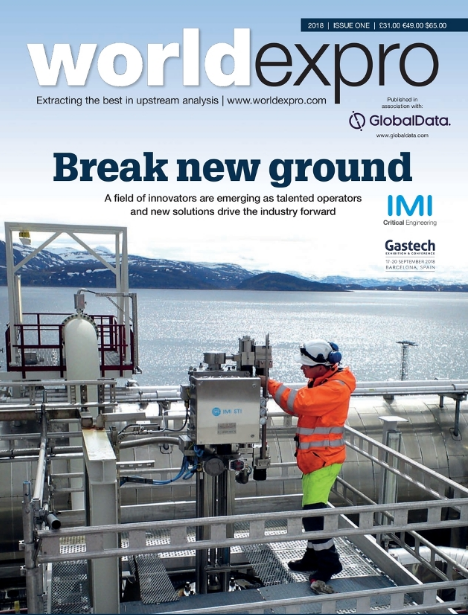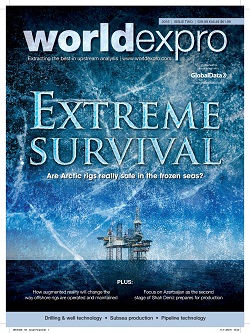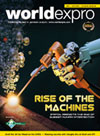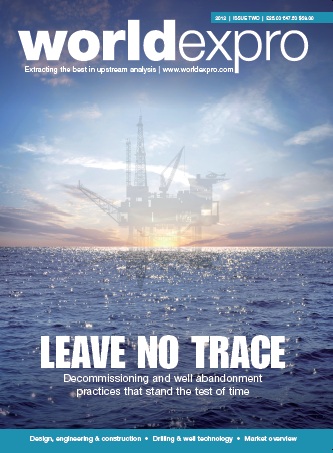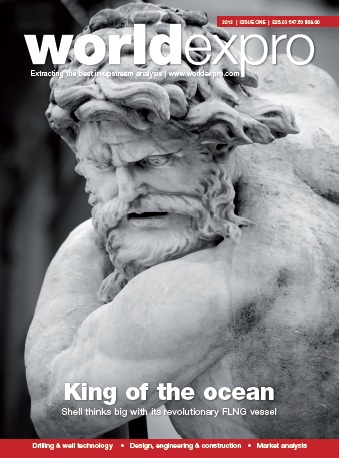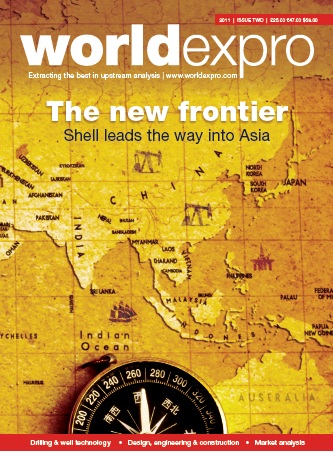The Publication
World Expro Issue Two 2020
Reality check: Offshore engineers have traditionally relied on a combination of book learning and practical demonstrations for advanced instruction. Now, with the emergence of virtual reality and augmented reality learning programs, we investigate how ExxonMobil and Baker Hughes are embracing these solutions to push the boundaries of what is possible in practical training.
When worlds collide: For decades, oil and gas dominated the offshore space. Now, we talk to Søren Lassen at Wood Mackenzie about how wind energy is muscling in - and the eagerness of operators on both sides of the energy divide to form new alliances for their mutual benefit.
A perfect storm: Covid-19 has seen the evacuation of hundreds of engineers from offshore oil and gas platforms around the world. We talk to stakeholders in North Sea oil about how new testing regimes are helping the industry weather the storm of the global pandemic in this most unforgiving of drilling environments.
Diverging fortunes: Since the discovery of massive offshore oil reserves in 2015, Guyana promises to become the world's fastest growing economy. We talk to David Goldwyn of the Atlantic Council about how the arrival of the oil industry to Guyana's shores could transform its fortunes for the better - or, conceivably, for the worse.
World Expro Issue One 2020
The impact of additive manufacturing has been felt in the supply chains of a whole host of industries – so why is the offshore energy sector only coming around to the idea now? Greg Noone talks to Stephen Fitzpatrick, machining and additive manufacturing team lead at the Advanced Forming Research Centre, and Ron van Wolferen, additive manufacturing manager in digitalisation at Shell, about industry conservatism – and innovation – in this area.
Until recently, pipeline repair was a time-consuming process that involved getting up close and personal with the area of concern. Now though, advances in robotic inspection technology promise to cut the time it takes to repair pipelines and the staff required to do it. Abi Millar talks to research scientist Dr Amit Shukla and Peter Routledge, project manager at Forth Engineering, to find out what these technologies will look like.
Also in this issue: Greg Noone talks to Marc Spieler, business lead for the energy sector at Nvidia, about interpreting seismic data using supercomputing technology, and Subrata Bhowmik, a senior subsea engineer at McDermott International, and Michael Smith, integrity analytics manager at ROSEN Group, discuss using AI-based predictive repairs to mitigate the impact of corrosion.
World Expro Issue Two 2019
Their scale and significance means that deepwater projects always come with risks attached; they require significant investment of time and finances. Isabel Ellis discusses how creative thinking and the intelligent use of data can result in efficiencies and savings with Marno de Jong, project manager of Shell's Appomattox project, and Kenneth Johnson, Halliburton’s completion manager for Total’s Egina field.
Although conventional seismic technologies have been around for decades, they still suffer from a number of drawbacks, especially when it comes to giving scientists a precise idea of underwater geology. Andrea Valentino talks to Dr Marcos Gallotti Guimarães, a geophysicist and expert in offshore energy, about how the industry is coping and how new ocean bottom node technology might be the way forward.
Also in this issue, some of the tasks for an offshore worker can be dirty or dangerous. Recent advances in robotics, however, could mean the removal of human beings from some of the riskiest situations encountered on the rig. Michael Shaw talks to Anders Røyrøy, a researcher in robotics at Equinor, about the capabilities of units currently being deployed by the energy company. And: methane emissions from the oil and gas industry have been a problem for decades, and can have a serious impact on the environment. Andrea Valentino hears from Mike Sommers, president and CEO of the American Petroleum Institute, and other industry experts about what companies are doing to tackle this issue.
World Expro Issue One 2019
As the rate of digitalisation and data creation picks up, it is imperative for the biggest players in the industry to have a robust policy to exploit these developments. Torbjørn Folgerø, senior vice-president and chief digital officer at Equinor, updates Grace Allen on happenings at the forefront of the Norwegian company’s digital strategy.
Predicting what lies beneath the surface of an oil field is a complex and data-intensive task. World Expro speaks to Bill Shea, CEO of Sharp Reflections, who explains how advances in data processing are making the guesswork more accurate – and how it’s all taking place within the cloud.
Also in this issue, Grace Allen talks to Jaco Fok, chief of innovation at OMV Petrom, about data challenges, how to change patterns of working and why, in the end, it’s all about people. Plus: Large oil and gas companies are teaming up with major providers of cloud computing services to deploy artificial intelligence (AI) to improve the interpretation of subsoil data. Jim Banks discusses how AI could facilitate a paradigm shift in the industry’s approach to geoscience with Dr Eirik Larsen, an expert in AI, as well as data management.
World Expro Issue Two 2018
As oil companies continue to move into ever more challenging reservoirs, they need to maintain an understanding of what's happening subsurface. Big data solutions are emerging as a means to make accurate interpretations and discover data quality problems ahead of time. Bill Shea, CEO of Sharp Reflections, speaks to Abi Millar about why pre-stack data is the future of seismic interpretation.
There is a history of digital technology being deployed in oilfields, and the evolution of technology has required the industry to keep pace with the potential efficiencies it brings. As companies move towards a more efficient and more autonomous future, Halliburton's digital technology leader, César Bravo, discusses what the digital oilfield means today and for the future of the wider industry.
Also in this issue: Solange da Silva Guedes, head of exploration and production at Petrobras, studies how the logistical and technical challenge of pushing further offshore into deeper water to locate new reserves, and how it is being met in Brazil's Campos and Santos Basins. Plus, The US Bureau of Safety and Environmental Enforcement is proposing changes to offshore safety rules due to President Trump's order to reduce the 'unnecessary burden' on industry. Julian Turner asks Greg Julian of the BSEE if it is possible to increase production and safety.
World Expro Issue One 2018
Carbon capture and storage is an essential part of the fight against climate change, but the associated technology is expensive and is yet to be deployed at the necessary scale. Abi Millar talks to Luke Warren from the Carbon Capture and Storage Association about why this technology is so important, and the vital role played by oil and gas producers.
In a time of sustained low oil prices, energy companies are looking to become leaner and more efficient by investing heavily in digital technology. This special report looks at how advances such as big data, artificial intelligence, blockchain and robotics are reshaping business models.
Also in this issue: As they move into more challenging oil fields, companies need strong flow assurance strategies in place to ensure production. Johan Kristian Sveen of the Institute for Energy Technology explains why flow assurance is so important. Plus, Rhona Flin of Aberdeen Business School explains how companies can benefit from the latest safety research.
World Expro Issue Two 2016
The region encompassing the Former Soviet Union is rich in natural resources. GlobalData examines the figures underpinning a bright future for an oil and gas powerhouse.
Augmented reality is only in its infancy, but the technology underpinning it will form an increasingly important part of the digital ecosystem over the next few years. Maersk Oil's head of corporate technology and projects, Troels Albrechtsen, explains how the technology is to be integrated into the company's Culzean gas project in the UK North Sea.
Also in this issue: The second stage of one of the world's largest offshore oil and gas projects, BP's Shah Deniz, in the Caspian Sea, is expected to commence production in 2018. World Expro reports on the very latest developments. Plus, US Bureau of Safety and Environmental Enforcement (BSEE) and the University of Alaska have collaborated on a study into offshore structures and their ability to survive extreme Arctic conditions, as BSEE Alaska Region analyst Scott Carr reveals.
World Expro Issue One 2016
In the context of stagnating oil prices and competition from more flexible markets, the UK's North Sea oil has long been seen as a difficult area. But with new projects on the horizon, could the region be bouncing back - and are the UK Government's new tax incentives finally bearing fruit? Oliver Hotham speaks to FranÇois Austin, energy practice leader at Oliver Wyman, about where UK energy in the North Sea can go from here.
Paul Weidman, vice-president of Macquarie Capital, and Jon Fitzpatrick, the company's head of oil and gas for Europe, Middle East and Africa, assess the UK North Sea oil and gas sector's travails in an unprecedented, uncompromising market for global oil production.
Also in this issue: World Expro speaks to GE Oil & Gas's Brad Smith about how the company's Intelligent Pipeline Solution can give a new, efficient perspective on gathering linear asset data and Hesham Abdel Haleem from Wood Group Kenny discusses how to eke out every last drop of value from existing assets.
World Expro Issue Two 2015
ExxonMobil prioritises process and personnel safety across its global asset portfolio, using a combination of centralised processes and peer-to-peer collaboration. Julian Turner talks to Benedikt Lammerding of ExxonMobil about the Safety Coach Concept, near miss reporting and encouraging buy-in from all company stakeholders.
With ISIS controlling large swathes of land in Syria and Iraq, and the potential of a wider escalation of conflict across the region, the oil and gas industry's heartland needs to beef up security and take stock of its options. Ian Lesser discusses how extra security steps are being taken to protect assets and personnel, and the difficult choice between keeping employees safe and pulling out of risky regions altogether.
Also in this issue: GE Subsea System's Tassos Vlassopoulos explores the industry-wide drive for E&P standardization; Greg Noone looks at the difficult choices multinationals are beginning to face in retaining extraction opportunities over the longterm; and Shirley Accini speaks to ExxonMobil's Dr Stefanie Asher about new pipeline sensor technology.
World Expro Issue One 2015
High-profile events such as the Macondo disaster act as tragic reminders of the critical importance of well integrity and safety in the upstream oil and gas industry, with lives and the wider environment at stake should anything go wrong. In this edition of World Expro, Marco op de Weegh from Shell outlines the technology and processes being employed in the company's pursuit of 'Goal Zero'.
Submersible vehicles have been exploring the ocean since the 1980s, and with energy companies venturing into increasingly inhospitable environments, the need for them to evolve becomes greater. Chris Godfrey speaks with Subsea UK's Neil Gordon to find out how technological advancements have enhanced the abilities of unmanned vessels.
Also in this issue: Technip's Guillaume Turpin and CEZ Consulting's Ian Theophilus discuss the trials, tribulations and technology of keeping upstream online, Oliver Hotham speaks to Mike Clark, engineer with Sakhalin Energy, about the challenges of working offshore of the Russian island of Sakhalin, and Anna Belova, upstream analyst at GlobalData, outlines the external pressures on the Russian oil and gas industry.
World Expro Issue Two 2014
Such is the scale and cost of the pipeline vandalism epidemic in Nigeria that Shell has decided to sell its assets in the region. Tens of thousands of barrels are stolen a day, while militants use sabotage as a political statement. In the latest edition of World Expro, Chris Godfrey investigates why vandalism has thrived in the Niger Delta, the extent of its impact and what measures can be taken to stop it.
Dual gradient drilling (DGD), a drilling method that eliminates the impact of water depth on offshore drilling, is allowing operators to drill the undrillable. Elly Earls speaks to AGR Enhanced Drilling's John Cohen to find out how it works and what challenges he thinks the offshore industry will face before the technology can be widely adopted.
Also in this issue, Julian Turner talks to Derek Newberry, Shell's Mars B business opportunity manager, about how the Olympus tension leg platform is helping the multinational to extend the life of the Mars field in the Gulf of Mexico, and Bert Natalicchio, VP engineering and Smart technologies at Shell, discusses how drilling wells to process automation at the refinery, and collecting information to drive faster and better decision-making, is fundamental to success.
World Expro March 2014
Coiled tubing has been around for some time, but until recently it was on the sidelines of mainstream oil and gas activities. In this issue of World Expro, Shirley Accini talks to Michael Taggart, chairman of ICoTA, about the developments that have enabled a wider range of applications for coiled tubing, making it one of the fastest-growing segments of the industry.
Offshore support vessels (OSVs) are the lifeblood of oil production platforms, a role that is set to increase as exploration goes deeper and further afield in the search of hydrocarbon sources. Arnstein Eknes and Bjorn-Johan Vartdal, DNV GL Norway, discuss the main considerations of OSV design, and the trade-off between efficiency and industry needs.
Elsewhere, Statoil has built expertise and led innovation in IMR over the last 15 years. Kaj-Ove Skartun talks to James Lawson about how developments in technology have improved processes and will enable it to meet the challenges posed by today's vast offshore fields..
World Expro September 2013
In this issue of World Expro, we look at how investment in nanotechnology is seen as key to developing oil and gas resources in the future, not least at Shell, whose chief scientist materials Sergio Kapusta talks to Philip Kleinfeld about 'the science of the small'. Shell's Arjen Dorland, meanwhile, tells Jack Wittels about the latest advances in the digital oilfield concept, which uses wireless technology to empower the company's mobile engineers.
Not content with the normal channels used for technological development, Statoil is casting its net much wider in an attempt to harvest innovative ideas from anyone with the relevant expertise. James Lawson speaks to Ole Dokka, the company's manager for innovation engagement, about a web portal designed to crowdsource ideas. ZADCO also discusses its development of the little-used concept of artificial islands, as a means of producing oil in the Arabian Sea.
World Expro March 2013
In this issue of World Expro, we discuss the growth in the use and sophistication of geosteering techniques with Halliburton's chief petrophysicist Roland Chemali. With the state-owned mammoths Petrobras and PDVSA investing heavily in their neighbouring countries, joint ventures among the continent's oil companies are flourishing. Elly Earls speaks to industry leaders from across the continent to find out where the collaborations are paying dividends, and Julian Turner talks to Kristen Ray, vice-president of health, safety, environment and community, at BHP Billiton about the organisation's holistic approach to HSE through its Zero Harm programme
World Expro September 2012
Decommissioning is big business and is only going to get bigger. As more long-serving reservoirs around the world reach the end of their economic life, well abandonment and dismantling is becoming more widespread. In the North Sea alone, UK Oil & Gas estimates that decommissioning activity could cost as much as £35.9 billion and continue until as late as 2060.
Elsewhere in this issue, Nigel Ash quizzes Tore Hoff of Norwegian giant Statoil about sound data management, Ove Tobias Gudmestad of the University of Stavanger discusses the challenges of Arctic exploration, and Saudi Aramco explains the benefits of powerful computational technique the Rietveld method.
World Expro March 2012
As oil prices continue to remain volatile and consuming nations become increasingly determined to secure access to energy supplies, choosing the right investment and the right business partner has never been more essential. Investing in new technologies to further push the boundaries of oil and gas exploration and production is becoming more and more crucial to companies to boost reserves and output.
World Expro is the premier information source for the world's upstream oil executives who need reliable and accurate intelligence to help them make critical business decisions. Aimed at senior board members, operations, procurement and E&P heads within the upstream industry World Expro provides a clear overview of the latest industry thinking regarding the key stages of exploration and production.
World Expro September 2011
While the Arctic offers opportunities for oil exploration, the challenge is to develop the rich reserves without putting the environment or workforce at risk. In this issue of World Expro, Statoil's Roald Byhre Sirevaag and Trond Stokka Meling discuss the best way to tackle such a fragile ecosystem. LUKOIL also discuss the logistical challenges of getting the Arctic's riches to the market.
Elsewhere, BP's Andrew Cockin explains how new drilling technologies are helping to wring more value from its maturing reserves. Plus, DONG Energy's Jens Erik Thygesen talks about the latest pipeline monitoring technology and its implications for the industry.
Petrobras's human resources director Mariangela Mundin reveals her company's vision of becoming the largest publicly traded oil producer and the recruitment and training regime this will require. Also Shell's Vianney Koelman explains how fibre optics improve can enhance extraction
World Expro March 2011
In this issue, Rayola Douphner of the American Petroleum Institute discusses the lessons learnt following the Deepwater Horizon accident, while chairman of the ONS foundation, Kjell Ursin-Smith, tells us about the positive steps being taken to find sustainable solutions to the problem of meeting energy demand.
Shell's Eric van Oort discusses how non-productive time can be minimised to maximise returns from production. Elsewhere, Samer Al Ashgar of Saudi Aramco examines the research being undertaken by the organisation to improve production processes and increase recoverable reserves.
We also talk to Statoil's Øystein Arvid Håland, who explains how new technology is being used to get the most out of dwindling North Sea reserves.
In addition, Petrofac COO Maarten van Aller tell us of plans to capitalise on the increasing demand for floating production vessels as exploration moves into deeper waters to find viable reserves.
